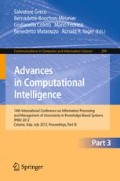Abstract
Bayesian networks are typically designed in collaboration with a single domain expert from a single institute. Since a network is often intended for wider use, its engineering involves verifying whether it appropriately reflects expert knowledge from other institutes. Upon engineering a network intended for use across Europe, we compared the original probability assessments obtained from our Dutch expert with assessments from 38 experts in six countries. While we found large variances among the assessments per probability, very high consistency was found for the qualitative properties embedded in the series of assessments per assessor. The apparent robustness of these properties suggests the importance of enforcing them in a Bayesian network under construction.
Access this chapter
Tax calculation will be finalised at checkout
Purchases are for personal use only
Preview
Unable to display preview. Download preview PDF.
References
van der Gaag, L.C., Renooij, S., Witteman, C.L.M., Aleman, B., Taal, B.G.: How to elicit many probabilities. In: Laskey, K.B., Prade, H. (eds.) Proceedings of the Fifteenth Conference on Uncertainty in Artificial Intelligence, pp. 647–654. Morgan Kaufmann Publishers, San Francisco (1999)
Renooij, S., Witteman, C.L.M.: Talking probabilities: communicating probabilistic information with words and numbers. International Journal of Approximate Reasoning 22, 169–194 (1999)
Johnson-Laird, P.N., Legrenzi, P., Girotto, V., Legrenzi, M.S., Caverni, J.-P.: Naive probability: A mental model theory of extensional reasoning. Psychological Review 106, 62–88 (1999)
Epley, N.: A tale of Tuned Decks? Anchoring as accessibility and anchoring as adjustment. In: Koehler, D.J., Harvey, N. (eds.) The Blackwell Handbook of Judgment and Decision Making, pp. 240–256. Blackwell Publisher, Oxford (2004)
Jacowitz, K.E., Kahneman, D.: Measures of anchoring in estimation tasks. Personality and Social Psychology Bulletin 21, 1161–1166 (1995)
Levy, H.: Stochastic Dominance. Investment Decision Making under Uncertainty. Studies in Risk and Uncertainty, vol. 12. Springer, New York (2006)
Author information
Authors and Affiliations
Editor information
Editors and Affiliations
Rights and permissions
Copyright information
© 2012 Springer-Verlag Berlin Heidelberg
About this paper
Cite this paper
van der Gaag, L.C., Renooij, S., Schijf, H.J.M., Elbers, A.R., Loeffen, W.L. (2012). Experiences with Eliciting Probabilities from Multiple Experts. In: Greco, S., Bouchon-Meunier, B., Coletti, G., Fedrizzi, M., Matarazzo, B., Yager, R.R. (eds) Advances in Computational Intelligence. IPMU 2012. Communications in Computer and Information Science, vol 299. Springer, Berlin, Heidelberg. https://doi.org/10.1007/978-3-642-31718-7_16
Download citation
DOI: https://doi.org/10.1007/978-3-642-31718-7_16
Publisher Name: Springer, Berlin, Heidelberg
Print ISBN: 978-3-642-31717-0
Online ISBN: 978-3-642-31718-7
eBook Packages: Computer ScienceComputer Science (R0)

